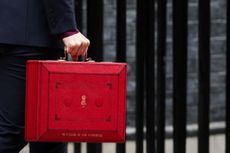Pension Tax
The latest news, updates and opinions on Pension Tax from the expert team here at MoneyWeek
-

What are my retirement income options?
We’re all told to save into a pension, but there’s widespread confusion about how to take an income from our savings and investments at retirement, a new study has found. We look at your retirement income options.
By Laura Miller Published
-

Reeves ‘won’t target tax-free pension cash’ – but damage already done for some savers
Chancellor Rachel Reeves has reportedly ruled out a cut to the amount of pension money retirees can take tax-free. But after months of speculation, it will be too late for anyone who pulled out of their pension based on pre-Budget jitters, as wealth experts warn against irreversible decisions.
By Laura Miller Last updated
-

Inside a Budget: ex-Treasury minister reveals the chess game behind your tax rises
In an exclusive interview with MoneyWeek former government insider David Gauke says chancellor Rachel Reeves will ‘need to show the richest are making a big contribution’ in the upcoming Autumn Budget
By Laura Miller Published
-

Pensions IHT reform: major changes needed says former minister
Experts are calling on the government to make the system for applying inheritance to pensions ‘more effective, efficient and humane’
By Dan McEvoy Published
-

Pension tax refunds: how to get your money back if you have been overcharged
Thousands of retirees recovered more than £48.5 million in overpaid tax from flexible pension withdrawals in the third quarter of 2025. Are you due a pension tax refund?
By Daniel Hilton Last updated
-

DIY pension investors take tax-free cash amid switch to ISAs
Self-invested personal pension (SIPP) investors are rushing to withdraw their tax-free cash and turning to ISAs amid fears of a pension tax raid in the Autumn Budget
By Laura Miller Published
-

12 ways pensions could be reformed in Budget – including an alternative to charging IHT
Pension savers could face new rules after the Budget if chancellor Rachel Reeves targets their pots to fill her own fiscal black hole – what potential pension changes could be on the way?
By Laura Miller Published
-

11 reasons you need to register for self-assessment before 5 October
There are lots of reasons why you may need to register for self-assessment. But you’ll need to act fast to meet the 5 October deadline
By Ruth Emery Last updated
-

Rachel Reeves urged to avoid pension tax relief raid or risk ‘Omnishambles Budget’
It might seem like low-hanging fruit, but cutting pension tax relief would be a dangerous move for the chancellor, says former pensions minister Steve Webb
By Katie Williams Published
